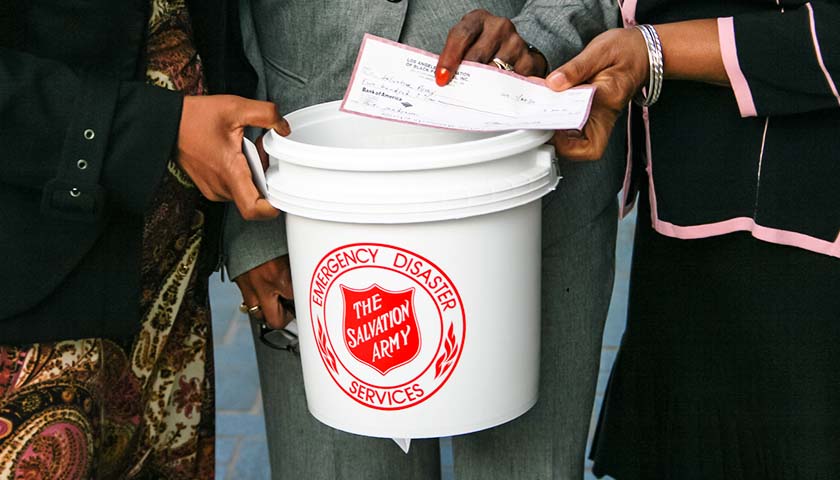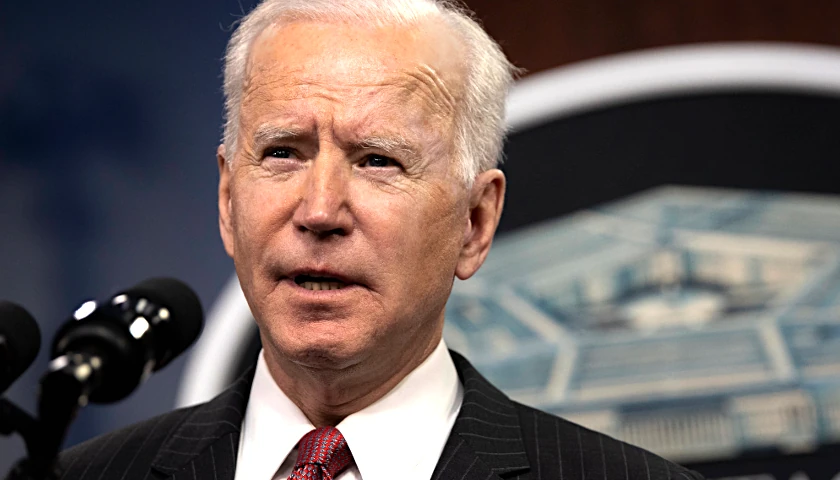by Kenny Xu
In regions like suburban Philadelphia, the Salvation Army’s red kettles at retail entrances are a timeless reminder of ordinary Americans’ philanthropic commitment to the less fortunate. Unfortunately, Salvation Army leaders have now dared to accuse these same Americans of participating in a “racist” society where “racial groups are placed into a hierarchy, with White or lighter-skinned people at the top.”
The organization’s “Let’s Talk About Racism” curriculum for its officers and soldiers has sparked national outrage for its admonition that white people “repent” for “racism” and for its belief that America “work[s] to keep White Americans in power.” Yet rather than admit that these woke ideas are not shared or supported by its donors or staff, the leadership of the Salvation Army has hidden its new effort from the public.
Since early this year, the Salvation Army has conducted mandatory diversity trainings for its officers that ascribe “racial inequity” to “racism.” The campaign defines racism as “any measure that produces or sustains racial inequity between racial groups.” This divisive framing alienates Salvation Army officers who work in the field to serve people. It suggests to officers, moreover, that any disparities between local black and white populations can be blamed on white racism, thus minimizing the problems endemic to communities themselves.
It’s far from evident that “racism” is the cause of problems in cities like Philadelphia, where progressive political leadership has played a crucial role in record-breaking crime and failing schools. But instead of carrying out its longtime mission of serving struggling neighborhoods in Philadelphia and elsewhere, the Salvation Army has begun focusing on its distorted definition of endemic racism.
The organization’s new woke direction is quickly becoming engrained in the institution. It recently hired two “diversity, equity, and inclusion” directors, who will have the power to veto any organizational curriculum or guidance that they view as not being DEI compliant, according to a Salvation Army officer. This woke “guidance” will be mandated to the organization’s more than 60,000 officers worldwide, according to one involved at the College for Officer Training.
In any type of organization – especially a massive one – dissent is necessary for proper functioning. The Salvation Army’s mission to “preach the gospel” of Christ and meet needs in his name isn’t political – and it’s not open to revision. But embracing wokeness imports a secular ideology into the organization, which shifts the focus away from its religious mission and toward ideological ones. To top it off, some Salvationists are forced to affirm these woke principles as a condition of service.
Today, the Salvation Army seems less focused on its religious foundation than on championing woke publications such as Ibram X. Kendi’s “How to Be an Antiracist” and Robin DiAngelo’s “White Fragility.”
There is no greater repudiation of the Salvation Army’s principles than a rejection of colorblind thinking. In 1880, Salvation Army commissioner Frank Smith said that the Army will be among “the first Christian communities of America who will faithfully and wholly break down the wall of partition separating the white from the colored.” Booker T. Washington, a historical advocate for colorblindness, said he respected the Salvation Army because it draws “no color line in religion.” Colorblindness was integral to the Army’s structure. Kendi and DiAngelo, by contrast, argue that colorblindness is wrong because it ignores the lived experiences of “marginalized groups” – an ideological claim. The Army can’t serve the Gospel and the world at the same time.
The Salvation Army’s DEI programs will do more to harm minorities and the impoverished than help. The organization’s members and supporters will not stand for these sorts of policies. As president of Color Us United, an organization created to stand up for the individual dignity of ordinary Americans against abusive woke policies, I traveled to the Army’s national headquarters in Alexandria, Va., to negotiate in good faith with its national commander, Kenneth Hodder. I asked him how critical race theory has helped a single inner-city child. He had no answer. Yet he has refused to release a statement denouncing critical race theory and rid the Salvation Army of wokeness within its curricular materials.
Wokeness is eating the organization’s good works alive. These policies help nobody except ideologues who want more control over the Army’s apparatus. The Salvation Army needs to reaffirm that America is not a racist country, denounce critical race theory, and commit to ridding itself of insidious ideas wreaking havoc within the institution.
With its donors beginning to push back, the organization stands at a crossroads. It has a chance to change course and recommit itself to the Gospel. The alternative is staying on a path that will betray its mission and harm the people whom it aims to serve. It’s time for the Salvation Army to reject wokeness.
– – –









For as long as I can remember, at this time of year there has been a bell-ringer with a red kettle outside the local grocery store where I shop, and I usually drop a few dollars in the kettle as I’m entering the store, as do most of my fellow shoppers. This year, I was looking forward to having an exchange of some sort with the bell-ringer when he/she told me I should apologize for being white…but, alas, this year there was no bell-ringer or kettle! I don’t know why, although I suspect it may be that the grocery store owner refused to allow them on his property this year…or maybe they couldn’t find any volunteers who were sufficiently woke. For whatever reason, the money that previously had been collected at this location will not be available to support the Salvation Army’s mission. I’m sure there must be many other similar examples of how the SA’s wokeness is hurting those they claim to be helping. They appear to be reaping what they have sown.
If the Salvation army is repudiating anything, it’s repudiating itsself out of existence. Then again no one ever said woke progressives were intelligent. Racist no doubt, but never intelligent.
You mean that the Salvation Army is finally repudiating its right wing routes? Seems too good to be true!
And as such the Salvation Army will suffer financially and will eventually become defunct due to a lack of funds.
Dec 2021 is the first time my family has not donated. The SA should get rid of the racist DEI husband-wife team. Thanks for including the link.,,,,
We worked with and went through disaster training with the Salvation Army about 6 years ago. We saw a total infiltration at the top. The Salvationist were replaced by corporate takeover. The old ones that were trying to hold the line had to retire and were put out by people hired to take their place. The staff was totally new and had no idea what the Salvationist believed. These folks are not Christians they are totally secular. It’s just another Marxist takeover as so many denominations have been infiltrated by Marxist trained leadership as well. Very sad, the Salvation Army at one time was truly wonderful and their main goal was to serve people. Give your money to on the ground working people like small local churches.
Even small local churches can be corrupted. Generations of Grace in Lebanon is a perfect example of modern day small church with a heavy Marxist leaning.
I never viewed the Salvation Army having anything to do with skin color, I saw the agency as assisting those in need. Whomever in the Salvation Army hierarchy moved to infuse racism into their mission is frankly, a racist. I will not be swayed by their requests nor their insults. I will no longer contribute to their cause as there are many other agencies that target their work toward those in need. Perhaps in the Red Kettles I’ll drop a simple note saying “All Lives Matter” and no, I will not apologize..
Concerned – You have stated exactly how I feel. I give a lot to charities, but Salvation Army will not be on the receiving end in the future.